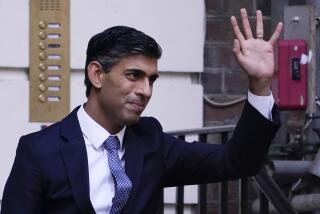The United States of Britain?
- Share via
BRITAIN’S NEW prime minister, Gordon Brown, was a day early with his Independence Day celebrations. On July 3, he made one of the most startling statements ever made by a newly installed premier before the House of Commons. Unless my ears mistook me, Brown pledged to transform the United Kingdom of Great Britain and Northern Ireland into the United States of Britain.
Opinion polls like the Pew Global Attitudes survey continue to testify to widespread anti-American feeling among British voters. Brown himself has hinted that he will pursue a less slavishly pro-American foreign policy than his predecessor, Tony Blair. Yet the “new British constitutional settlement” Brown promised last week owes an unmistakable debt to the American system. To be precise, his speech contained no fewer than seven American-inspired initiatives:
* “For centuries,” declared Brown, the prime minister and the executive branch “have exercised authority in the name of the monarchy without the people and their elected representatives being consulted.” His aim, by contrast, is to “entrust more power to Parliament and the British people.” Nota bene: from royal authority to “We, the people.” Remind you of anything?
* Brown offered to delegate the power to declare war to the House of Commons, albeit on the basis of a resolution rather than a statute (unlike the power to ratify new international treaties, which will also be given to the Commons). Again, this imitates the United States, where (under Article I, Section 8 of the Constitution) Congress alone has the power to declare war.
* The Commons will be empowered to hold pre-appointment hearings for public officials such the chief inspector of prisons, the civil service commissioner and members of the Bank of England’s Monetary Policy Committee. This is a straight American import.
* The government is to publish, on a regular basis, a national security strategy. Another import: President Bush has published two such documents since 2001.
* There is to be a British national security council. The American model for this dates to 1947.
* The House of Lords is almost certainly to become an elected body. Hey, Gordon, how about renaming it “the Senate”?
* Above all, Brown proposes to “codify ... both the duties and rights of citizens and the balance of power between government, Parliament and the people.”
In concluding his statement, he explicitly raised the possibility of a Bill of Rights and a written constitution.
Wow. It’s taken more than 200 years, but finally a British prime minister has accepted that Hamilton, Jefferson, Madison and Washington were right.
Given the current public mood, these proposals might have been expected to elicit a storm of indignation. An earlier generation of Tories would have been dismayed by such an assault on time-honored traditions, not least for its obvious anti-monarchical undertone. Yet Conservative leader David Cameron’s response seemed to be: Why stop there? What about adopting American-style federalism too? Why not have four states -- England, Scotland, Wales and Northern Ireland -- each with its own assembly, leaving only matters of collective concern to the federal Parliament at Westminster?
Now, I agree that there are some superficially plausible arguments for an Americanization of the British system of government. Under Brown’s predecessor, there is no doubt that the power of the executive relative to Parliament grew intolerably and was systematically abused by the prime minister and his cronies. However, there are even more compelling arguments against the creation of a United States of Britain.
The most important of these is that, whatever it says on paper, in practice the U.S. Constitution gives the executive branch even more power than is currently enjoyed by the British executive. Did Congress restrain Bush from declaring war on Iraq? Of course not. Did congressional hearings prevent Bush from making a succession of disastrous appointments to high office, notably to the Federal Emergency Management Agency? Again, no. Did it improve American foreign policy to publish a National Security Strategy? On the contrary. And how about that Bill of Rights? Did it stop the administration from treating habeas corpus as an optional extra when it comes to terrorist suspects? I don’t think so.
As if to prove the point, Bush chose last week to give a brazen exhibition of the quasi-monarchical power the occupant of the White House now wields by annulling the 30-month prison sentence handed down in June to I. Lewis “Scooter” Libby, the former chief of staff to Vice President Dick Cheney, for perjury and obstruction of justice. Why? Ostensibly because the sentence was “excessive.” In reality, it was because Libby is a loyal insider who knows where a great many of this administration’s bodies are buried.
Guess how much attention this president will give to the 3,000 other current petitions to have sentences commuted. One second? Two?
Louis XIV famously declared: “L’etat, c’est moi.” How long before Bush declares, “I am the States”? It may be that, as some of his fans maintain, Brown really is a reclusive, scholarly type who derives his knowledge of constitutional matters exclusively from the academic tomes that line his study. Maybe he is blissfully unaware of the rise of the imperial presidency in the United States.
But there is another possibility. Perhaps the truth is that Brown understands the American system of government very well. Perhaps what impresses him most is precisely its combination of apparent popular liberty and actual executive privilege.
Frankly, when a man who has waited 10 long years to become prime minister offers on Day 1 to hand power back to the people, there has to be a catch.
nferguson@latimescolumnists.com
More to Read
Sign up for Essential California
The most important California stories and recommendations in your inbox every morning.
You may occasionally receive promotional content from the Los Angeles Times.










